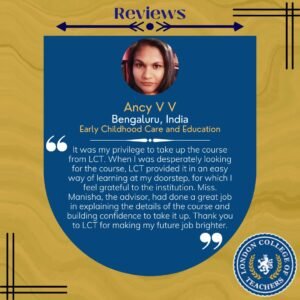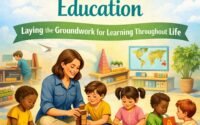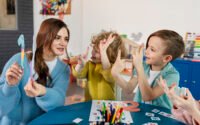Essential Skills for Early Childhood Care and Education
A Certificate Course in ADHD can assist early childhood teachers obtain the skills and knowledge needed to work with children who have ADHD. Further this attention deficit hyperactivity disorder course is helpeful for children in their proper growth just as a normal child have. There are a few fundamental abilities and skills that every kid should develop during their early childhood education, regardless of their specific situation. This blog will look at the crucial abilities and competences that young children should acquire, such as social and emotional ability, cognitive ability, language and communication skill, and physical development. We will also talk about the value of early childhood and care education in fostering success and lifetime learning.
What is the importance of Social and Emotional Development in early childhood?
Social development implies to a child’s ability to build and maintain significant relationships with adults and peers, whereas emotional development refers to a child’s ability to express, understand, and manage their emotions, as well as respond properly to the emotions of others. Early childhood mental health is related to social and emotional development, and both have a significant impact on the mental health of young children.
The following subdivisions fall under the Social and Emotional Development domains for young children, toddlers, and preschoolers which are developed by teachers who are trained at special teacher training institute:
- Relationships with Adults
- Relationships with Other Children
- Emotional Functioning
- Sense of Identity and Belonging
Why Language and Communication Skills is important in early childhood care and education?
The development of a child’s cognitive, emotional, social, physical, and linguistic skills is greatly influenced by the language in children between the ages of two and five. The growth of a child depends on both structural language abilities and pragmatic communication skills (such as proper behavior and successful nonverbal communication). All these skills are developed by teachers who have pursued a teacher training course focusing these skills.
Effective methods for fostering children’s growth and development include enhancing language use, increasing vocabulary, and enhancing communication abilities. Children learn to operate and engage with the world through communication and empathy.
In fact, language is so important to a child’s development that many students who may have learning challenges, mental health issues, or behavioral issues also have a diagnosis of language impairment.
What is the importance of cognitive development and executive functioning?
To measure intellectual or academic ability, cognitive development involves learning to think, brain development, and the ability to process information or follow instructions. However, language processing difficulties can significantly impact a child’s cognitive development.
Another important set of skills that contribute to cognitive development is executive function, which comprises cognitive flexibility, working memory, and inhibitory control. These skills help with planning, focus, remembering instructions, and task completion, and they begin to develop early in life.
Why Physical Development and Motor Skills is necessary in early childhood care and education?
Physical development is the progression of a child’s physical ability, including their capacity to sit, stand, walk, and run, as well as their growth.
Motor development, which is a part of physical development, describes the improvement in children’s capacity to use their bodies and physical skills. The two categories of motor development are gross motor skills and fine motor skills. It’s crucial to promote physical exercise in kids so they may build both little and large muscles and burn the calories they eat.
Children must possess both gross motor skills and fine motor skills in order to develop physically. Larger bodily functions like balance, coordination, intentional control, movement, and stability are all governed by gross motor skills.
Fine motor abilities, on the other hand, are the coordination and dexterity required to move smaller portions of the body, such as the thumb and forefinger, which are often used to pick up little things.
Why Creative and Critical Thinking Skills are necessary?
To think creatively implies approaching problems or circumstances from a different perspective in order to come up with unique and original solutions.
Contrarily, critical thinking is a methodical and structured process of studying, interpreting, evaluating, and coming to logical conclusions based on the facts at hand.
Critical Thinking vs. Creative Thinking – Key Differences
- While creative thinking aims to generate something novel, critical thinking aims to evaluate the value or accuracy of something that already exists.
- Creative thinking involves generating ideas, while critical thinking involves analyzing them.
- Creative thinking is about generating multiple ideas, while critical thinking is about narrowing down ideas to a single solution.
- Creative thinking explores possibilities, while critical thinking evaluates likelihood.
- Creative thinking involves breaking away from established norms, while critical thinking applies established norms.
Develop creative & Critical Thinking Skills.
- Develop your own set of “Three Ifs” to help you generate new ideas and explore possibilities.
- Set aside time to let your imagination run wild and practice dreaming without limits or constraints.
- Make time for focused and concentrated creative thinking to bring your ideas together in a cohesive manner.
- Hone your ability to pitch your ideas by practicing and refining your presentation skills.
- Collaborate with others and bounce your ideas off them to gain new perspectives and insights.
Conclusion
While an Attention Deficit Hyperactivity Disorder (ADHD) course can provide teachers with specialized knowledge to manage children with ADHD, all young children must develop a fundamental set of abilities and skills. A child’s growth must include early childhood education since it lays the groundwork for success and lifetime learning. Online teacher training courses have made it simpler for teachers to learn new skills and stay updated on the latest research and best practices. We can assist all children attain their full potential and succeed in the classroom and beyond by putting a priority on the development of fundamental abilities and skills in early childhood education.






